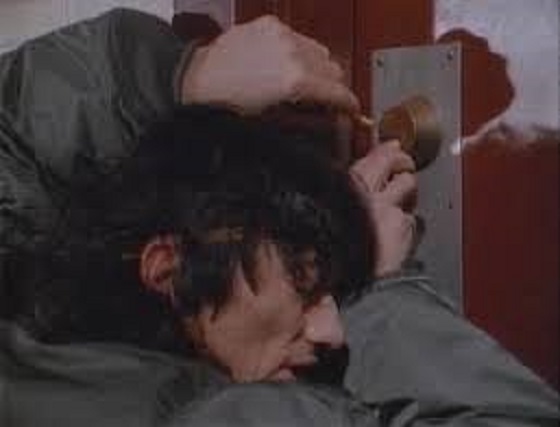Canadian horror, sometimes referred to as “Canuxploitation” movies, are fascinating. Sometimes, they are cinematic masterpieces like David Cronenberg’s The Brood, Scanners, or Videodrome. Other times, they are brilliant head-scratchers like Deranged or Cathy’s Curse. But no amount of Cronenberg classics or low-budget cult flicks can prepare a viewer for the Canadian enigma known as Beyond the 7th Door.

Beyond the 7th Door is about a career thief named Boris (the awesomely named Lazar Rockwood from Witchblade) who visits his ex-girlfriend, Wendy (Don’t Turn Out the Light’s Bonnie Beck), right when he gets out of jail. Boris wants to turn his life around, but needs one more score to do it, so he convinces Wendy to help him break into the mansion of Lord Breston (Gary Freedman in his only screen credit), the paraplegic millionaire for whom she works. Boris believes that it should be a pretty easy job, especially with his girl on the inside. Once they’re in, however, Boris and Wendy find that Lord Breston has been expecting them. The millionaire locks the pair in and playfully sends them through a series of booby-trapped rooms, each more deadly than the last, in an effort to give them a fighting chance at his money.

Beyond the 7th Door is the brainchild of Yugoslavian writer/director Bozidar D. Benedikt, although “writer” may be a bit of a stretch, as the film seems as if it is more of a plot outline (and a repetitive one at that), with Rockwood and Beck left to awkwardly buy time with banal and meaningless dialogue. It’s one of those movies that has to be seen to be believed, and once it is seen, it has to be seen again. It’s laughably bad, but it’s a laugh that the viewer will want to relive over and over.

At 75 minutes long, Beyond the 7th Door still feels padded, with long pauses and drawn out silences separating each progressively harder escape room. When they’re not desperately pretending to catch their breath, Boris and Wendy are engaging in misplaced dialogue about her sexy legs (all while she’s stuck in a room that is flooding with freezing water). Boris concentrates way too hard on the seemingly simple puzzles in each room, fiddling about with his thief tools and stopping himself constantly to have to think about things. And, of course, Boris and Wendy stop everything to have sex right in the middle of their traumatic dilemma. Beyond the 7th Door is probably what The Room’s Tommy Wiseau (subject of the brilliant The Disaster Artist) would have come up with if he had set out to make a horror movie.

As low-budget and campy as Beyond the 7th Door is, it does seem to have influenced modern horror. The film was made in 1987, and it would be hard to believe that the filmmakers behind both the Saw franchise and, to a lesser extent, the Cube movies did not at least hear about Beyond the 7th Door and draw some inspiration from the maze-like house filled with rooms that are laced with deadly traps. The traps are straightforward in design, utilizing things like falling spiked ceilings and trash compactor-esque walls, but they’re effective in their simplicity. Beyond the 7th Door even features the “gamemaster” talking to the “players” through an intercom system, which is very similar to how Saw’s Jigsaw killer spoke to his victims via cassette tapes. To top it all off, one of the rooms in Beyond the 7th Door contains a corpse, a detail that was also used in the first Saw movie. If James Wan and Leigh Whannell didn’t see Beyond the 7th Door, they got lucky guessing at some of the set pieces.

The music in Beyond the 7th Door is credited to three people: Michael Clive, Brock Fricker, and Philip Strong. It’s unclear as to which musician did what on the soundtrack, but since the music is mostly keyboard-bass-drum type electronic groove-oriented eighties flash, it can almost be assumed that the three composers made up the rock band responsible for the tunes. The score is a little silly in its simplistic execution, but it is exciting and suspenseful, adding a cool note of tension to Boris and Wendy’s escape plans. The score seems as if it would work just as well without the movie, though, so if there’s a soundtrack album to Beyond the 7th Door, it’s probably a fun listen.

In the grand scheme of things, Beyond the 7th Door is not as cinematically important as other Canuxploitation films like, say, Terror Train. But when it comes to pure low-budget schlock, it’s a tough one to beat.
